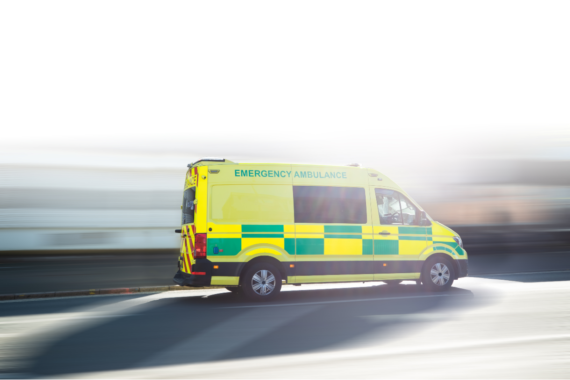A&E attendances and ambulance callouts rose by one fifth in December

Figures from December on A&E attendances show more people seeking care than at any point since 2011, while ambulance callouts were at record levels.
There were 2.28 million A&E attendances in December, almost 22% higher than the same time last year, with more than half waiting more than four hours to be seen.
Category one ambulance callouts in December were a fifth higher than the previous record and call handlers answered more 999 calls in December 2022 than ever before.
Data also suggested heart attack and stroke patients were routinely waiting more than three hours for an ambulance.
Pulse reported last week that GPs are increasingly having to give interim treatment to patients waiting for ambulances, or transport patients to hospital themselves.
In December, bed occupancy was more than 90% beds occupied with an average of 13,439 beds a day taken up by patients medically fit for discharge – up almost a third higher than the previous year.
The latest figures from NHS England show trusts made some small progress on waiting times in November.
The waiting list of 7.2 million dropped by 30,000 as hospitals delivered elective treatment to 70,000 more patients than in November 2021, NHS England said.
There was also a record number of diagnostic tests at 2.17 million, the figures show, including higher than ever numbers checked for cancer.
Trusts are being asked to book in all remaining patients waiting more than 18 months for their appointment or treatment by the end of March to hit this target by the April deadline.
NHS national medical director, Professor Sir Stephen Powis, said: ‘As staff responded to record A&E attendances, 999 calls and emergency ambulance call outs as the “twindemic” led to unprecedented levels of respiratory illness in hospital, they also continued to deliver for patients with more people than ever before receiving diagnostic tests and cancer treatment.
‘These figures show just how hard our staff are working, not only in the face of extreme pressure but also in bringing down the Covid backlogs and checking more people for cancer than ever before in one month.
‘The NHS will keep its foot on the accelerator to continue to make progress on the covid backlog and hospitals have today been asked to ensure anyone waiting longer than 18 months has their treatment booked in before March.’
Wes Streeting MP, Labour’s shadow health secretary said: ‘The NHS is in the biggest crisis in its history. The terrifying truth is that patients in an emergency can no longer be sure the NHS will be there for them.
‘Heart attack and stroke victims are routinely waiting over three hours for an ambulance, when every second counts. 24 hours in A&E is not just a TV programme, it is the grim reality for too many patients. Too many lives are being lost as a result.
‘After 13 years of Conservative mismanagement of the NHS, expecting them to fix this crisis is like asking the arsonist to put out the fire they started – it is not going to happen.’
Related Articles
READERS' COMMENTS [1]
Please note, only GPs are permitted to add comments to articles












This could be connected to the NHS ‘winding down’ as a whole over the festive season, GP service, hospital service, labs, social services, nursing and the capacity just isn’t there with so many seasonal bank holiday and operational restrictions. Streeting, Labour MP, has a good view on this: “the terrifying truth is that patients in an emergency can no longer be sure the NHS will be there for them.” That’s bad, Mr Rashy Sanuk PM, very bad indeed. Also, there’s something far wrong with categorisations of Ambulance responses when things like a stroke, and other conditions with Golden Response times, are not being dealt with inside those times when the risk of death or permanent disability increases dramatically outside the time. Many doctors would agree that ambulance response times need to be recategorised to end these deaths (and of course more money to the NHS). Also, because illness and disease know no time-boundaries, why should there be worse services in December or any other month of the year? This is shoddy; people need their holidays from work but why so many in December? Is it not high time these Bank Holidays and services properly available should be spaced out more evenly.
This will require a huge amount because a huge amount has been cut back over many years including 9,000 acute emergency and medical beds completely lost! Yes, Wes Streeting MP, too many lives being lost, and true: it is ‘Terrfying’!